
You've crafted a captivating concept and diligently recorded your first few episodes. Now comes the exciting yet technical stage: publishing your podcast and sharing it with the world! Here is a guide to take you through the crucial steps to take your podcast from the editing room to every listener's favourite platform.
1. Choose Your Podcast Hosting Platform
Think of your podcast hosting platform as your podcast's online home. It's where you'll upload your audio files, generate your RSS feed (a vital link that allows directories to find your show), and gain access to valuable analytics to understand your audience. Popular options include Buzzsprout, Podbean, and Spotify for Podcasts, each offering different features and pricing plans. Consider factors like storage space, bandwidth, monetisation options, and ease of use when making your choice.
2. Create Your Podcast Cover Art and Intro/Outro
First impressions matter, and your podcast artwork is often the listener's first encounter with your show. Invest in high-quality, visually appealing cover art that reflects your brand and concept. Similarly, consider creating a professional intro and outro sequence with catchy music and clear information about your show. These elements add polish and enhance the overall listening experience.
3. Submit Your Podcast to Directories
Once your podcast is uploaded, it's time to make it discoverable! Submit your podcast to major directories like Apple Podcasts, Spotify, Google Podcasts, and Stitcher. This process typically involves providing your RSS feed URL, show description, and artwork. Approval times can vary, so be patient and ensure your information is accurate and engaging.
4. Promote Your Podcast and Connect with Your Audience
Now that your podcast is live, the real magic begins: building your audience! Promote your show across various platforms - social media, your website, email marketing, and even reaching out to relevant communities and blogs. Engage with your listeners by responding to comments, participating in online discussions, and potentially hosting Q&A sessions or listener feedback episodes.
5. Leverage Social Media and Networking
Social media platforms are powerful tools for connecting with potential listeners and fellow podcasters. Create dedicated pages for your show, share engaging snippets and teasers, and use relevant hashtags to increase discoverability. Consider collaborating with other podcasters in your niche for cross-promotion opportunities, expanding your reach and audience base.
Need help?
Studio 808 understands the intricacies of podcast production and is here to help you every step of the way. We offer professional podcast recording services, including editing, mixing, and mastering, to ensure your audio sounds polished and ready for broadcast.

















